FORT CAMPBELL, Kentucky -- A new program from the USO focuses on connecting transitioning troops and their spouses with resources that can help them tackle life in the civilian world.
The USO's RP/6, known in the past as Rally Point 6, is a series of one-stop-shop transition centers at major military bases in the U.S. that focuses on helping veterans and their families move out of the military world and into the civilian one.
Part of the USO's Transition 360 Alliance, the program seeks to connect with military families during the 18 months before transition and through the 18 months after, a time that many veterans fall through the cracks as they hit the reality of life outside the military.
"Our mission is to do what the USO has always done, which is to make you feel like you're cared for, that you've done your service and that you deserve to be treated well," said Tonya Wacker, the site manager for RP/6 at Fort Campbell, Kentucky. "I think people forget that military service is a gift to us, that we are protected. What the USO does is say 'thank you' for that, and what this program does is we continue to stay involved in your life."
Military transition help for veterans
Although military officials put a strong emphasis on troops going through intense group-based transition classes, many attend just to check off the requirement, and the amount of information presented can be overwhelming.
"This is the last thing you should be checking the box on -- but isn't that the thing you've been learning to do your whole career?" Wacker said. "We do things differently here at RP/6 -- everything is one-on-one."
Veterans looking to find work, get help with housing, guidance on financing, medical assistance or really anything related to moving into the civilian world can get that assistance at RP/6, Wacker said.
For many troops, real transition doesn't begin until the day they no longer put on the uniform. Through resources within the USO and partnerships with the community, RP/6 can assist veterans with pretty much anything they need, she said.
The program is also working to bring resources from the community into the USO facility.
At Fort Campbell, for example, the Department of Veterans Affairs' closest major facility is in Nashville, Tenn. -- about an hour's drive away. For many veterans, getting to the VA from Fort Campbell is a major burden, and those dealing with post-traumatic stress issues often find the traffic in Nashville to be a huge extra stress.
RP/6 is working to have the VA bring its resources to the USO facility on a monthly basis to make it easier for veterans to get the help they need without having to travel.
'People have problems'
RP/6 officials also don't care why you left the military or what problems you have had since, Wacker said. They are simply there to help veterans, regardless of their circumstances.
"People have problems -- that's none of my business. My business is to help you," she said. "People make mistakes in their life and they have consequences ... but who is going to give you a second chance?"
Military transition help for spouses
Leaving the military community is a major change for former military spouses, as well, Wacker said, and any resources RP/6 has for veterans, they also share with transitioning spouses.
"You want to go to school, we help you get into school. You want to find a job, we help you find a job. You want to get involved, we help you get involved," she said.
One of the major problems with transition classes hosted by the military is that spouses are permitted to attend only on a space-available basis. That means a spouse could very well find childcare or take off work, only to arrive and be turned away because the class is full.
Wacker said spouses can come to RP/6 and get the same help and information on an individualized, one-on-one basis, without worrying that there won't be space for them.
"I know there are problems with the system. We're not here to fix them, we're not that," she said. "We're the USO. What do we want for you? We want you to be happy, we want you to feel connected to your community. We want you to have a home, and we want you to feel like you're being taken care of."
A full list of RP/6 centers can be found here. USO officials said they plan to open as many as eight more locations in the next year.
-- Amy Bushatz can be reached at amy.bushatz@military.com.





























